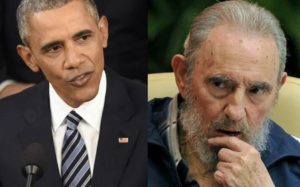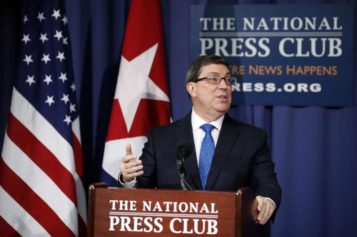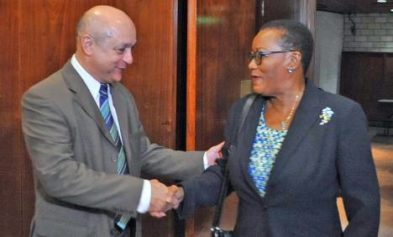President Obama made history when he became the first U.S. president in 88 years to visit the island nation of Cuba. One person he did not meet with was Fidel Castro, who nonetheless had much to say in condemning Obama’s trip. In a full-page letter in the Cuban Communist Party newspaper Granma, entitled “Brother Obama,” the former president of Cuba rejected Obama’s historic visit.
In the letter, President Castro manages to provide a history lesson, his interpretation of the history of Cuba and its struggles against colonialism and imperialism. He began by comparing the exploitation of Cuba’s colonial past to the present-day efforts to economically control and profit from the country.
“The kings of Spain brought us the conquistadores and masters, whose footprints remained in the circular land grants assigned to those searching for gold in the sands of rivers, an abusive and shameful form of exploitation, traces of which can be noted from the air in many places around the country,” he said. “Tourism today, in large part, consists of viewing the delights of our landscapes and tasting exquisite delicacies from our seas, and is always shared with the private capital of large foreign corporations, whose earnings, if they don’t reach billions of dollars, are not worthy of any attention whatsoever.”
Castro also spoke of the various Cuban leaders and revolutionaries, such as José Martí, who “did not want to return to the United States, and there was no one who could make him,” and the Black leader Antonio Maceo, who once said: “Whoever attempts to appropriate Cuba will reap only the dust of its soil drenched in blood, if he does not perish in the struggle.”
In his own speech in Havana, President Obama noted that Cuba and the U.S. were colonized by Europeans and built by slaves, and both nations can trace their heritage to slaves and slave owners.
“The native populations don’t exist at all in Obama’s mind. Nor does he say that the Revolution swept away racial discrimination, or that pensions and salaries for all Cubans were decreed by it before Mr. Barrack Obama was 10 years old,” Castro wrote in response, also discussing Cuba’s role in fighting apartheid South Africa and helping Angola, Mozambique, Guinea Bissau “and others under the fascist colonial domination of Portugal.”
And the elder Cuban leader also spoke of the U.S.-orchestrated Bay of Pigs invasion.
“In 1961, just one year and three months after the triumph of the Revolution, a mercenary force with armored artillery and infantry, backed by aircraft, trained and accompanied by U.S. warships and aircraft carriers, attacked our country by surprise,” Castro said. “Nothing can justify that perfidious attack which cost our country hundreds of losses, including deaths and injuries.”
Moreover, Castro spoke of the weapons and assistance that apartheid South Africa had received from the U.S and Israel.
“I do not know what Obama would have to say about this story now,” Castro said in his letter. “I am unaware as to what he did or did not know, although it is very unlikely that he knew absolutely nothing. My modest suggestion is that he gives it thought and does not attempt now to elaborate theories on Cuban policy.”
Upon hearing President Obama’s insistence that it is time “to forget the past, leave the past behind” and “look to the future together,” Castro declared it was enough to give one a heart attack: “After a ruthless blockade that has lasted almost 60 years, and what about those who have died in the mercenary attacks on Cuban ships and ports, an airliner full of passengers blown up in midair, mercenary invasions, multiple acts of violence and coercion?”
Castro concluded by saying his “dignified and selfless” people would not renounce their glory, rights, or the spiritual wealth they have gained, warning Obama that the Cuban people are able to take care of themselves.
“We don’t need the empire to give us anything. Our efforts will be legal and peaceful, because our commitment is to peace and fraternity among all human beings who live on this planet,” Castro noted.
Meanwhile, Dr. Anthony Browder, director of the IKG Cultural Resource Center, recently provided Atlanta Black Star with his analysis regarding America’s intentions in Cuba, which echo the concerns of Castro.
“This country strengthening its relationship to Cuba is probably going to do more harm than good. I mean it’s nice to think it’s going to benefit the Cuban people,” Browder said.
He noted that the U.S. has had a duplicitous relationship with other white nations, as America isolated Cuba for decades because it was a Communist country supported by Russia, and yet has maintained relations with Russia. He cited recent events, in which three U.S. astronauts were sent to the International Space Station in a spaceship launched from Russia.
“The only reason why this country is strengthening relationships with Cuba is that they plan to exploit Cuba. And that’s real,” Browder offered. “So in the midst of that exploitation, there will also be opportunities for advancement. And so we have to work strategically to minimize the exploitation, and to expand these opportunities such that they benefit the Cuban people, the majority of whom are of African ancestry,” he said. “So it affords us a wonderful opportunity to build new bridges, but we really have to be strategic in how we go about doing that.”
Browder said this is an important time in history in which Cuba needs to know that the Pan-African community is here to support them. Building relationships, he argued, is a way to overcome the exploitation, the casinos and prostitution and drugs that will likely resurface as in the days of the Batista regime.



